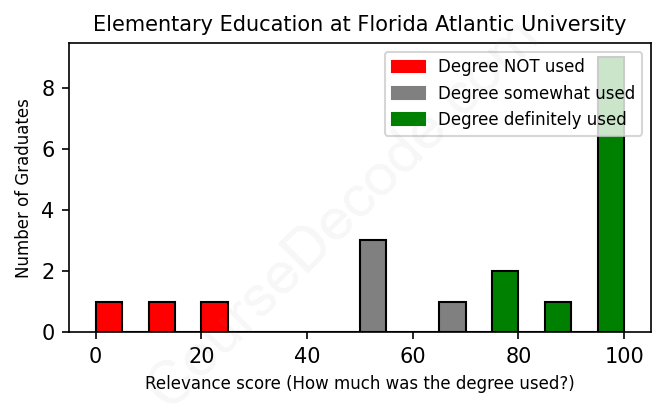
First, some facts. Of the Elementary Education graduates from Florida Atlantic University we've analyzed , here's how many have used (or NOT used) their degree in their career:

These are estimates based on AI analysis of 19 LinkedIn profiles (see below).
The verdict? Above average. Overall, with an average relevance score of 73%, Elementary Education graduates from Florida Atlantic University have a higher likelihood (+6%) of finding work in this field compared to the average graduate across all fields:
And for comparison, here's the chart for all profiles we've looked at across all degrees.
Also, after graduating, 36% of these graduates have pursued further education other than another Bachelor's degree (such as a Masters degree or other), compared to the average across all profiles of 35%. This suggests you may need more than just a Bachelors degree to be competitive as a Elementary Education graduate.
See the details:
|
Relevance score: 69% We think this person has gone into a career only somewhat relevant to their degree. We think this person has gone into a career only somewhat relevant to their degree.
DEGREE INFOGraduated in 2019 from Florida Atlantic University with a Bachelor of Education - BEd in Elementary Education. Also pursued further education since (see below). JOB HISTORY SINCE GRADUATIONEnglish Language Teacher Broward County Public Schools Aug 2019 - Aug 2021 Program Data Specialist  Proximity Learning, Inc. Sep 2021 - May 2023 Customer Success Consultant  National Geographic Learning Feb 2023 - Present FURTHER DEGREES DONE SINCE GRADUATINGMaster of Education - MEdWestern Governors University 2021 - 2021 ABOUTExperienced Data Specialist with a demonstrated history of working in the e-learning industry. Skilled in Reading Intervention, Qualified Teacher, English Language Learners, Technology Education, and Gifted Education. Strong professional with a Master of Education - MEd focused in Learning and Technology. |
The top 10 most common jobs done by the graduates we've analyzed (ranked most common to least) are:
When looking at the job paths of graduates with a degree in Elementary Education from Florida Atlantic University, a clear trend emerges. Many of these individuals end up working as teachers in various capacities—like Elementary School Teachers in public schools or educators at charter schools. These roles are directly related to their degree, as they involve fundamental aspects of teaching and child development that the program covers. It’s great to see that a significant number of graduates are not just landing teaching positions, but also applying the specific skills they honed during their studies, such as classroom management and lesson planning.
However, there's also a notable mix of other roles that diverge from traditional education jobs. For instance, several graduates have taken roles in marketing, event management, and even risk management, where the connection to their Elementary Education background is pretty tenuous. While these jobs might leverage some soft skills like communication and organization learned during their studies, they don’t fully tap into the core competencies of teaching or educational practices. So, while many grads are thriving in teaching roles, it’s clear that a fair number are choosing paths that don't directly relate to their primary field of study. It's an interesting reflection of how versatile an education degree can be, but it also raises questions about the relevance of their classroom skills in those other industries.
Here is a visual representation of the most common words in job titles for Elementary Education graduates (this is across all Elementary Education graduates we've analyzed, not just those who went to Florida Atlantic University):

So, if we look at the career paths of graduates from Florida Atlantic University with a degree in Elementary Education, there’s a pretty clear trend. Most of these alumni tend to start off strong in the education field, snagging jobs as teachers either right after graduation or just a year or so later. For instance, many graduates from 2011 and onward have consistently landed roles like elementary school teachers, working in various school districts. It seems like the first job for many is often a teaching position, which makes sense given their degree focus.
Now, when we look at these graduates five to ten years down the line, we see a mix of success and some diversions. A number of them remain in education, taking on more advanced roles or specializations, like becoming team leads or even moving into curriculum development. However, there are also cases of people shifting away from traditional teaching jobs to roles in other fields, such as risk management or marketing. This indicates that while a lot of graduates stick with education, some explore different careers outside of teaching. Overall, it seems that those who hold onto their teaching jobs find themselves in good positions related to their degree, while others may find themselves in various unrelated fields after a few years. It’s a mixed bag, but education seems to lay a solid foundation for many of these graduates!
Getting a Bachelor’s degree in Elementary Education, whether at Florida Atlantic University or elsewhere, is pretty manageable if you’re ready for it. It usually involves a mix of classroom theory and hands-on experiences, like student teaching, which can be super rewarding but also demanding at times. You’ll tackle subjects like child development, teaching methods, and educational psychology, plus a good amount of coursework in general education. While it’s not a breeze, it’s definitely not as tough as some other majors that dive deep into complex theories or heavy workloads. If you’ve got a passion for working with kids and a solid work ethic, you’ll likely find it’s a fulfilling journey more than a grueling one!
Most commonly, in the LinkedIn profiles we've looked at, it takes people 4 years to finish a Bachelor degree in Elementary Education.
Looking at the job paths of these FAU Elementary Education grads, it seems like their earning potential is a mixed bag. Many of them started off as teachers, which typically doesn’t pay super well, especially in the early years. Teachers often make around $40k to $60k annually, depending on experience and location, but there are some who have transitioned to roles in marketing, management, and even insurance, which usually come with better paychecks. For instance, the grad who moved from teaching to a risk management role likely makes significantly more than they used to. Overall, while some are probably doing just fine financially, it’s safe to say that most started at lower salaries typical for educators, and it might take a while before they see those bigger bucks unless they switch fields or climb the education ladder.
Here is a visual representation of the most common words seen in the "about" section of LinkedIn profiles who have a Bachelor degree in Elementary Education (this is across all Elementary Education graduates we've analyzed, not just those who went to Florida Atlantic University). This may or may not be useful:

Here are all colleges offering a Bachelor degree in Elementary Education (ordered by the average relevance score of their Elementary Education graduates, best to worst) where we have analyzed at least 10 of their graduates: